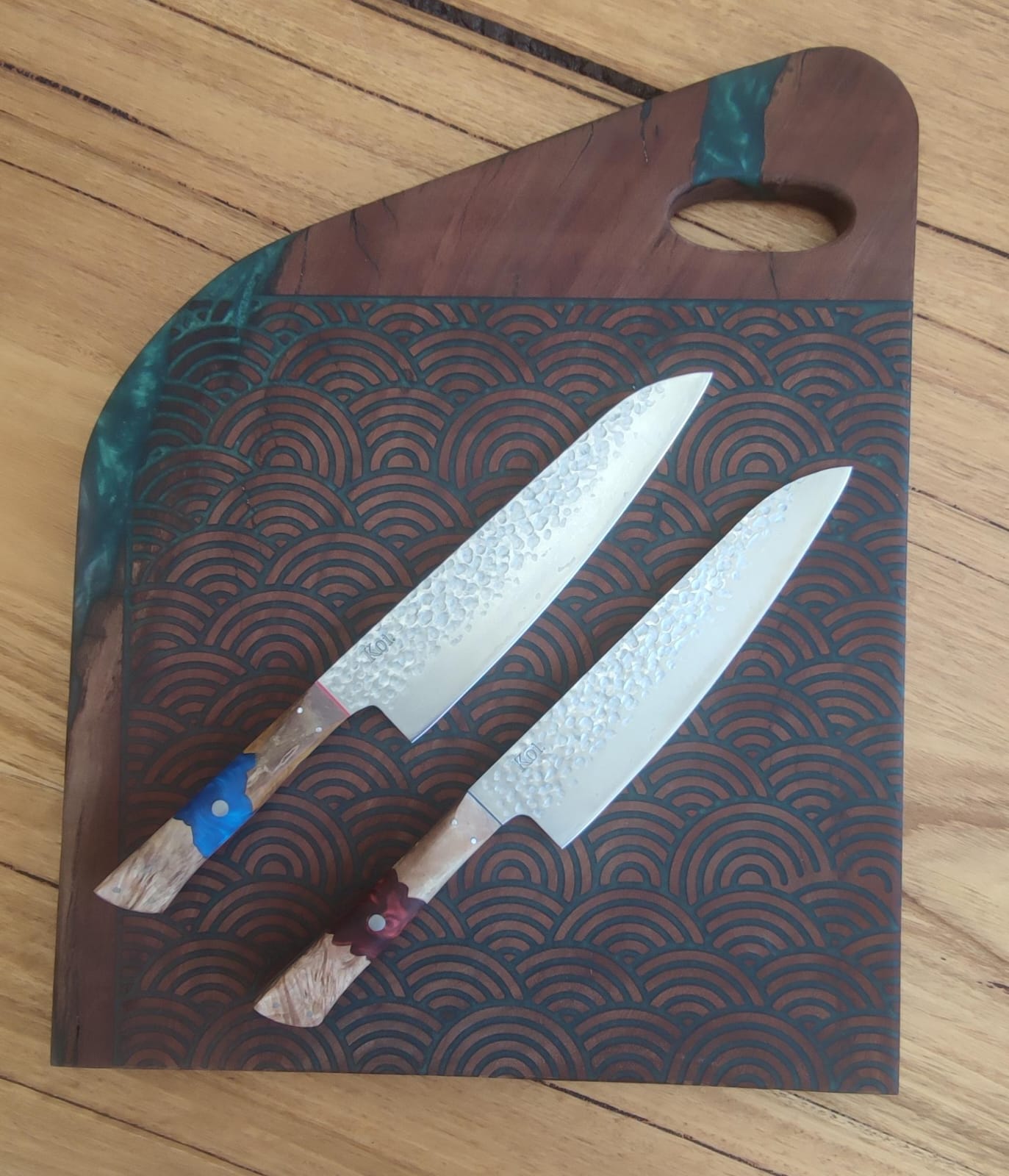Ever wondered how a simple blade-sharpening ceremony could encompass centuries of tradition and meditative wisdom?
Explore the mysterious allure of Japanese blades, where functionality and time-honoured customs intertwine. Engage in whetstone sharpening, an ancient practise entrenched in the culinary heritage of Japan, in which each stroke combines tradition with thoughtful reflection.
Explore intricate rituals and techniques that elevate knife maintenance to a sacred art, forging a profound connection to the core of culinary expression.
Sharpen a blade; illuminate the soul.
The Art of Whetstone Sharpening
Whetstone sharpening is more than a mere maintenance task; it's an art form that resonates with the soul of Japanese knife craftsmanship. Understanding this practice involves exploring its intricacies, from the tools used to the philosophy that guides each stroke.
The Whetstone's Melody
At the core of whetstone sharpening lies the harmony between blade and stone. It's a dance that requires precision and patience, where the knife's edge meets the abrasive surface of the stone in a rhythmic motion. This process isn't solely about refining the edge but fine-tuning the knife's spirit.
Achieving the Perfect Bevel
Central to the art is the creation of a perfect bevel angle—a marriage between the blade's geometry and its intended purpose. The acute understanding of how different blades interact with varying stones reveals the essence of a blade's design and its philosophy.
Honing Craftsmanship
Whetstone sharpening is a celebration of craftsmanship. Every stroke and pass affirms the sharpener's connection with the blade. This practice transcends mere skill; it embodies respect for the materials and the pursuit of perfection.
Whetstones as Storytellers
Whetstones carry stories—of blades they've touched, sharpeners' hands that guided them, and the silent transformation they orchestrate. Each whetstone is a chapter in a blade's journey, etching its history with every sharpening session.
Unveiling the Meditative Ritual
Delving into the heart of Japanese knife craftsmanship reveals a mesmerizing dance—the meditative ritual of whetstone sharpening. This intricate practice elevates blade maintenance beyond necessity, infusing it with spirituality and focus.
The Path to Inner Precision
In Japanese knives, sharpening is akin to a contemplative journey. Each stroke against the whetstone, an intimate dialogue between sharpener and blade, fosters a profound connection. The process beckons the sharpener to center their thoughts, cultivating mindfulness.
Harmony of Senses and Steel
As the knife glides across the stone's surface, senses synchronize in an orchestration of movement, sound, and touch. This multisensory symphony draws sharpeners and blades into a harmonious rhythm, enhancing awareness and finesse.
Ritual Symbolism
Every facet of the sharpening ritual carries symbolic significance. The whetstone itself, a bridge between past and present, embodies the wisdom of generations. Each stroke echoes the essence of dedication and discipline, echoing the unbroken lineage of Japanese blade mastery.
Zen and the Art of Knife Sharpening
Rooted in Zen philosophy, whetstone sharpening is a form of active meditation—an opportunity to be fully present. The repetitive nature of the ritual transcends the mundane, allowing the sharpener and blade to merge, becoming a single entity in pursuit of perfection.
The Whetstone: A Portal to Blade Mastery
Japanese knives are revered not only for their craftsmanship but also for their remarkable sharpness. Whetstone sharpening serves as the key to unlocking their true potential, creating a harmonious blend of artistry and function.
A Symphony of Grits: Matching Whetstones to Knife Steel
Selecting the right whetstone is akin to composing a symphony. Different grits harmonize with distinct knife steels, sculpting the blade's edge with precision. Refer to the table below for a quick guide:
|
Grit Range |
Knife Type |
Purpose |
|
200-800 |
Restorative |
Repairing chips and nicks |
|
1000-3000 |
Sharpening |
Restoring cutting sharpness |
|
4000-8000 |
Polishing |
Enhancing edge refinement |
The Dance of Angles: Achieving Blade Nirvana
Honing the blade demands mastering the angle dance. Maintaining a consistent angle, typically around 15-20 degrees, ensures an optimal edge. Pro tip: use angle guides for precision during sharpening.
The Ritual of Progression: Patience and Practice
Whetstone sharpening is not a sprint but a mindful journey. Begin with coarser grits, gradually transitioning to finer ones. Patience rewards you with a keen edge that glides through ingredients effortlessly.
Beyond Sharpness: Honing Cutting Confidence
Whetstone sharpening transcends mere utility. It instills a sense of pride and deepens your connection with your knives. As you refine your skills, you'll find your culinary prowess elevating.
The whetstone is a portal to blade mastery, a conduit through which craftsmanship and tradition flow, ensuring your knives are sharp and exceptional.
Finding Harmony Through Sharpening
Whetstone sharpening isn't just mechanical; it's a conduit to a profound connection between the sharpener and the blade. This process breeds mindful engagement, where each stroke bridges the gap between the artisan and the knife.
Fostering a Deeper Connection
In the realm of Japanese knife craftsmanship, sharpening surpasses mere physicality. It's an art that melds the blade's edge with the sharpener's essence. The rhythmic dance of stone against steel forges a bond, refining both the tool and the artisan.
The Concept of Mindfulness
Mindfulness is pivotal in this ritual. Each movement and angle adjustment—is deliberate and intentional. As the sharpener aligns with sensations—the stone's texture, the blade's resonance—the world narrows to this singular act.
Preserving Tradition and Sharpening Skills
In Japanese culture, the practise of whetstone sharpening is a revered legacy passed down through generations. Masters of this skill pass on their knowledge and techniques, ensuring the survival of this renowned practise. Apprentices learn the physical process of sharpening as well as the reverence and attention that goes along with it.
Sharpening isn't just a solitary pursuit; it thrives on the communal energy of training sessions and gatherings. Sharpening enthusiasts exchange ideas, compare skills, and celebrate the spiritual tie that exists between sharpener and blade. These gatherings develop a sense of community and a dedication to preserving the history of whetstone sharpening.
While contemporary technology provides quick remedies, the art of whetstone sharpening is a time-honoured custom.
Enthusiasts weigh the convenience of modern procedures against the intimate connection that traditional sharpening provides. This harmonic combination ensures the craft's spiritual and technical core is preserved.
Conclusion
As we wrap up our endeavour at sharpening with a whetstone, we find ourselves at a place where ritual and mindfulness meet. The gentle rhythm of sharpening and the way the blade and stone work together are signs of a deeper link. This art takes care of both the knife and the spirit.
In your journey as a knife enthusiast, consider the Japanese knife not merely as a tool but as an extension of your intention. Embrace the meditative dance of whetstone and steel, where sharpness is practical and symbolic.
So, take a step into Japanese knives, where tradition and creativity meet. Begin your journey of self-discovery through the meditative grace of sharpening—a path that hones both the blade and the soul.




